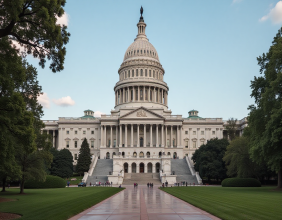Summary
- Nationwide Building Society to offer 90 per cent mortgaged loans to first time homebuyers
- The move follows Sunak’s announcement of a Stamp duty holiday for properties till 31 March 2021
- However, the institution has made underwriting of loans more stringent than before
- The move is expected to boost the struggling housing market in the nation
Last week, Rishi Sunak announced stamp duty holiday on property purchases of up to £500,000. British financial institution, Nationwide Building Society would be offering lower deposit mortgages beginning 20 July 2020, after the Chancellor announced the stamp duty move. This could be an icing on the cake for first time homebuyers and housebuilders in the United Kingdom.
As the novel coronavirus washed up the shores of the United Kingdom, most of the sectors came to a screeching halt along with the housing market. To get the housing market moving, Rishi Sunak, the Chancellor of the Exchequer announced a stamp duty holiday on all property purchases in England and Northern Ireland up to £500,000 last week.
The new scheme could allow the businesses in the housing market to free things up and the first-time buyers could enjoy a stamp duty holiday till 31 March 2021. To find out how much duty one could end up paying, use the gov.uk calculator.
Buying a home is on wish list of most people. However, for most of us, this dream takes a backseat for obvious reasons, especially during trying times like the ongoing corona pandemic. Many people could struggle even for the initial deposit amount (down payment), with uncertainties hanging around their jobs. Nationwide Building Society has decided to help people in fulfilling their dream. The British financial institution has announced some new mortgage offers that would enable first time homebuyers to mortgage up to 90 per cent of the value of their asset. However, the institution has made underwriting of loans more stringent than before.
Also read: Bonanza for the Hospitality & Housebuilding Sector in Chancellor’s Summer Statement
Earlier in June, Nationwide Building Society capped its maximum loan-to-value (LTV) at 85 per cent in anticipation of slump in housing prices due to the impact of the novel coronavirus. Considering, the Chancellor’s statement, the company felt sensible enough to cap its maximum loan-to-value (LTV) at 90 per cent for first time buyers and study the initial response of the market. However, the company would be offering its maximum loan-to-value (LTV) of 90 per cent on selective properties only, with a maximum mortgage term of 25 years.
In addition, the British financier would lend to people who are financially secure and stable (would not lend to anyone still furloughed). It is obvious to understand that someone who would not keep up with mortgage payments is likely to lose their property to the lender.
The British lender has placed a comprehensive system of checks and balances before disbursing loans to first time buyers. The age of the property which the first-time buyers intend to buy must be at least two years or more. The source of the initial down payment made for loan disbursal could not be family or friends. In addition, the homebuyers would be subjected to credit history and affordability checks.
Also read: UK banks decide to offer mortgage holidays as a fallout of the coronavirus epidemic
Important things to consider before going for a mortgage
Let us understand how a mortgage works. Let us assume that the house, which an applicant intends to buy costs £100 thousand in the market. The loan applicant is willing to make a down payment/ deposit/ equity of £20 thousand. The remaining £80 thousand is the loan amount. Therefore, the LTV in this example would be 80 per cent, which means that the bank would be financing only 80 per cent of the value of the house. The higher the LTV amount, the tougher it is to get the loan. In addition, a higher LTV would mean higher risk for the lender, which would also lead to higher interest rates for the applicant.
After the financial crisis (2007-08), LTV amounted to be lower than the value of the asset (because of the concept called negative equity), as property prices crashed. To understand this better, let us assume that the asset is fully financed by the bank, £100 thousand. Now if the property loses value in the market and drops to £70 thousand, the property is not enough to pay the loan back. This is a pitfall of taking a higher LTV loan amount.
Getting a mortgage is one of the biggest financial commitments most people make. Mortgage is a form of secured loan, which is different from a car loan or a loan on credit card. In case of a mortgage, a secured loan is made to the applicant on an asset (house), which the loan applicant intends to buy.
It is a two-sided deal; the bank would be offering loan against the house (security) at a much lesser interest rate in comparison to unsecured loans. The interest rate is low because the loan is secured in comparison to unsecured loans such as credit cards. A secured loan means that if the applicant defaults on loan repayments, the bank reserves the right to seize the property and might sell it to recover the loan.
Mortgage has one benefit upfront of lesser interest rates in comparison to unsecured loans. Another thing to understand is that the property prices can go up or down, which is why banks do not always lend the full value of the property to someone who wants a home loan. However, earlier, in some parts of the world, it was possible for an applicant to get a loan of higher value than the property, but before the financial crisis of 2008. Those days are now long gone.
To summarise, the leading home financer Nationwide Building Society has come back to high loan-to-value mortgage rates. It is a result of the Chancellor Rishi Sunak’s summer statement that slashed stamp duty for homes prices below £500,000. This move is definitely going to bring cheer for the struggling housing market in Britain. At the same time, the lender could end up taking more risk on its balance sheet in a debt-ridden environment. The uncertainty with respect to the novel coronavirus is still prevalent and yet another wave of the pandemic could wreak havoc on the ongoing infrastructure and housing projects. If the housing market loses value, lender would be left high and dry.




_06_30_2023_10_37_44_979056.jpg)
